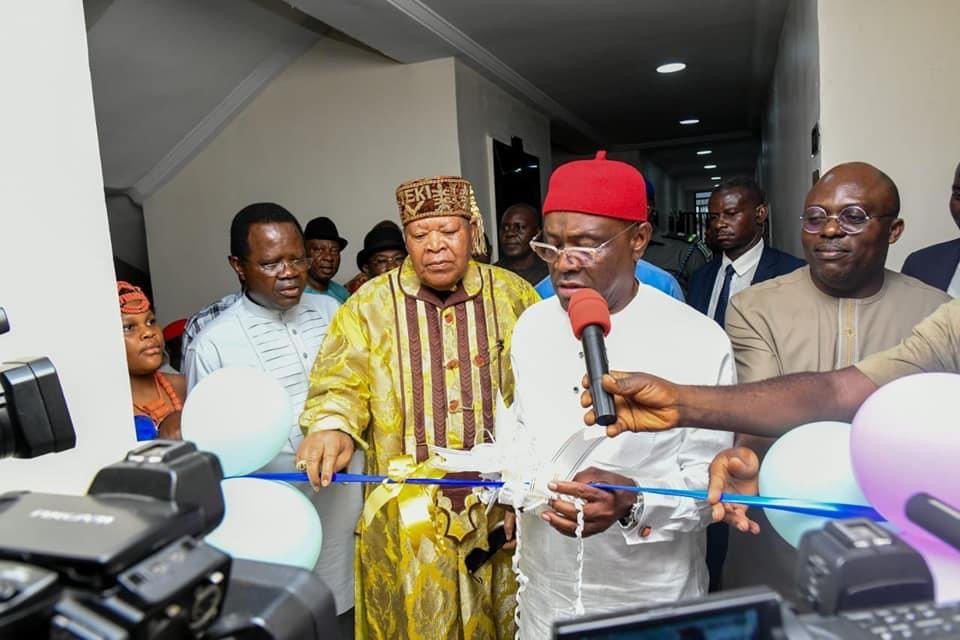Governor Nyesom Ezenwo Wike has commended the Rivers State Council of Traditional Rulers for setting up library, archive and museum to preserve the cumulative cultural heritage of people of the State for future generations.
Speaking at the inauguration of the newly set up library, archive and museum situated at the traditional rulers council secretariat in Port Harcourt on Thursday, governor Wike said the facility will help ensure that cultural heritage of the various ethnic nationalities in the State would not be lost to future generations.
The governor commended the chairman of Rivers State Traditional Rulers Council, King Dandeson Douglas-Jaja (Jeki V) and Amanyanabo of Opobo Kingdom, for initiating the project aimed at preservation of the customs, practices, objects, artistic expressions, and values of people of the State.
He said what King Dandeson Douglas-Jaja (Jeki V) has done, will be remembered by future generations. According to him, the king has contributed in making the people of the State understand their history and culture.
“Let me commend the chairman because we have had chairmen of traditional council before, but we never had a thing like this. And that is why I have always say to people, leadership is key. When you have a leader who knows what to do, and what to achieve, it’s very easy for him.
“And it was under him that we built this secretariat and it is under him we are opening a library that will showcase the history of our people, who we are, the culture of our people.”
The governor said the traditional rulers council library which is a rich repositories of historically and culturally significant collections of the people of Rivers State will be of immense benefit to students of history and scholars across the world.
“Part of the problems we have had is that most our people don’t even know our history and that is the truth of the matter. Most of our people don’t even know our culture and so when you don’t have documentary evidence of this nature, it becomes difficult even for scholars and students who want to carry out research on a particular ethnic group or people of Niger Delta. I am sure students of history will find this interesting and supportive in their research work.”
The Rivers State governor also appreciated and thanked renowned historian and archologist, emeritus professor Ebiegberi Joe Alagoa for his contribution in setting up the library.
In his remarks, the Commissioner for Chieftaincy and Community Affairs, Charles. C. Amadi, said the setting up of the library, archive and museum is part of governor Wike’s achievement.
He said the facility will be of immense benefit for research scholars interested in the rich cultural heritage of Rivers State.
In his address, King Dandeson Douglas-Jaja (Jeki V) and Amanyanabo of Opobo Kingdom, said the library will serve as a repository of ancient history, sanctuary for preserving ancient records and home for showcasing archaeological finds for the present and future generations to see how Rivers people lived in their time many centuries ago.
The King explained that the library contains history books of kingdoms of Rivers State and those of other kingdoms in Nigeria. He disclosed that since the council started test run of the library, two doctoral graduates, a Nigerian from Ahoada West and a Briton from Oxford University have used the facility.
“The archive houses references to documents that could be accessed from National Archives Enugu. We have in the archive also CDs of traditional dances such as the famous Okrika Odum, the Kalabari Owu Aru Sun festival and the Queen Elizabeth II visit to Port Harcourt in 1956.
“We are hoping to take custody of some of Dr. Adams Fiberesima’s symphonic works, like Ibini Ukbabi and Opu Jaja. We hope others who have documents they want to preserve will find our facility useful.
“The museum serves as a repository for the preservation of the pinnacles of our ancient civilization. We look forward to the day when these facilities will be put to use and render service to researcher and seekers of knowledge of our enviable history most of which have spanned many centuries.”




